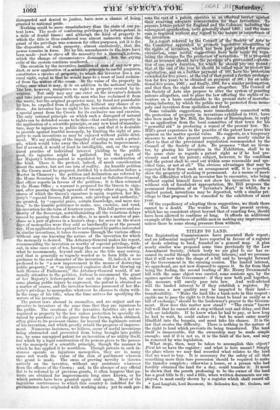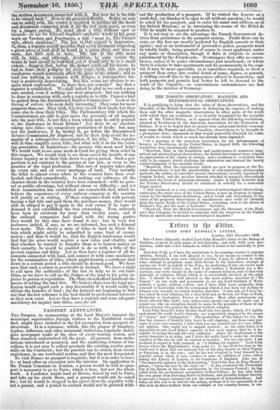TITLES TO LAND
TILE Registration Commissioners have iiresented their report; and an influential majority* have reported in favour of a register of deeds relating to land, founded on' a general map. A plan nearly similar was proposed some time previously by the Law Amendment Society, (which body we are glad to see has re- sumed its useful though unostentatious labours,) and we presume that it will now take the shape of a bill and be brought forward by the Government in the ensuing session. The landed interest, we apprehend, are not now disposed to oppose it. So far from that being the feeling, the second reading of Mr. Henry Drummond's bill with the same object was carried, some sessions ago, by the squires against the Government : if they now both pull together, this measure will surely pass into law. And well-advised will the landed interest be if they establish a register. By its means a new quality may be imparted to their land— transferability. " Make the land like a bank-note in this respect : enable me to pass the right to it from hand to hand as easily as a bill of exchange," should be the landowner's prayer to the Govern- ment. How does this matter now stand ? "The swain" knows full well that he cannot stir a step without cost and delay, and that both are indefinite. If he knew what he had to pay, or how long he had to wait, he could endure it ; but he must enter nearly blindfold into the bargain, and must take his chance. It is the law that creates the difficulty. There is nothing in the nature of the right to land which prevents its being transferred. The land itself is immoveable, but the ownership may be made simple enough; and if it is not so, it is the fault of the law, and may be removed by wise legislation.
What steps, then, may be taken to accomplish this object ? First let us have the register : and what is here meant? Simply the place where we may find recorded what relates to the land that we want to buy. It is necessary for the safety of all that something more than bare possession should be required to make the transfer complete ; otherwise a lessee, or a person who had forcibly obtained the land for a day, could transfer it. It must be shown that the persolt professing to be the owner of the land has a good title to it ; and a title, when written documents are em- ployed, is most easily shown by a register which shall record all • Lord Langdale, Lord Beaumont, Mr. Bellenden Ker, Mr. Coulson, and Mr. Frere.
tgd with it. ,present its req. t fo Tflioyr ar is the title " efOre an acre be=aII the deeds' or 67tH
.1 1.•: SI I 1 '11
IAN; for
20. II*
i" Ise
.41 9.1 4-0 I W I • :In YR0411Mci9Pw.,14 l ; i '11 a 11 . nl mt. • t tk. „al a la a 1 •11 4:11 ,I; I 1 A e k • 1164113t -tiCw911 I ta• 1 I ni` t....q • ; • i ; U OfU 1E 1•411 1 • • •
ET71 11 go
i7: tE? .3116,1V°Tallhe
/. 11 •
I .... • IC "fib cept in
0
,/ 4. • • I ti411 1/S o t al and as 194R ,111t9 Ot .14 9. fin, wi a pse, .a retrospective his- positivery depre 'g. But this seems too obvious to re- vue much explanation. Is there then any remedy ? Say that a register is established. We shall indeed be glad to see such a mea- sure carried, even if nothing else were proposed; but can nothing be done in connexion with such a register as to title. Cannot a hint bogained from, the Encumbered Estates Commission ? Look at its throng of suitors, who seem daily increasing! They come for more pinposes than ,one. They wish, it is true, to sell their lands, but they come also to dear their titles. The Parliamentary title which the Commissioners are able to give saves the necessity of all inquiry into the past title. Is not this a boon which may be safely granted to. .the landowner in Great Britain ? Let there be no absolute raking into titles—no compulsory production of deeds : but may not the landowner, if he wishes, it, go before the Encumbered Estates Commission for England, and by their help avoid the ne- cessity of a retrospective investigation of his title. The register will in time simplify every title ; but what will it do for the exist- ing generation of landowners—the persons who most need' help? We would wish to see some mode devised for giving them relief in this respect. We would wish to see them saved the trouble of any future inquiry as to their title down to a given period. Such a pro- position is not contrary to the genius of our law, or even to the practice of the legal profession. This sort of inquiry takes place on every sale and on every mortgage of land. 'Very recently the titles to almost every estate in the country have been over- hauled, and that compulsorily. In making our railways, all the charter-chests in the country have been ransacked—with no gene- ral or public advantage, but without alarm or difficulty ; and yet their examination has established one remarkable fact, which we believe the expi?rience of every railway company in the country will justify us in stating. If these companies dealt with persons having a bad title, and paid them the purchase-money, they would still be obliged to pay it again to the real owner if he came to demand it and established the true ownership. Now, railroads have been in existence for more than twenty years, and if the railroad companies had dealt with the wrong parties they would by this time have found it out : but in very few instances indeed, if any, as we are informed, has such a demand been made. This shows a state of titles to land in Great Bri- tain which might safely be submitted to sonic kind of exami- nation ; and thus it would be, that the English landowner would find that his acres would acquire a new value and vitality, and that whether he wanted to transfer them or to borrow money on their security, he would be enabled to do so with a tithe of the present expense and delay. Let us then have a register of all do- cuments connected with land, and connect it with some machinery for the examination of titles, which might furnish a certificate that down to a certain period a title should be deemed good. We have seen that such a course is practicable in Ireland. We have a right to call upon the authorities of the law to help us in our land- titles, as we have to call on the Judges of the land to try petty in- juries to person or reputation. The State should afford landlords the means of setting the land free. We believe that even the legal pro- fession would regard such a step favourably if it would really fa- cilitate the transfer of land ; for the lawyers are beginning to find out that the law reformer is the best friend to professional interests as they now exist. Let us then have a register and some adequate machinery for inquiry into titles, once for all. •
the wait-ten to he ourli, can be safoly, 9446431 bl weiFk
1,1 .•
• ir
11 • a• I •
•
II I
Ibtu



























 Previous page
Previous page